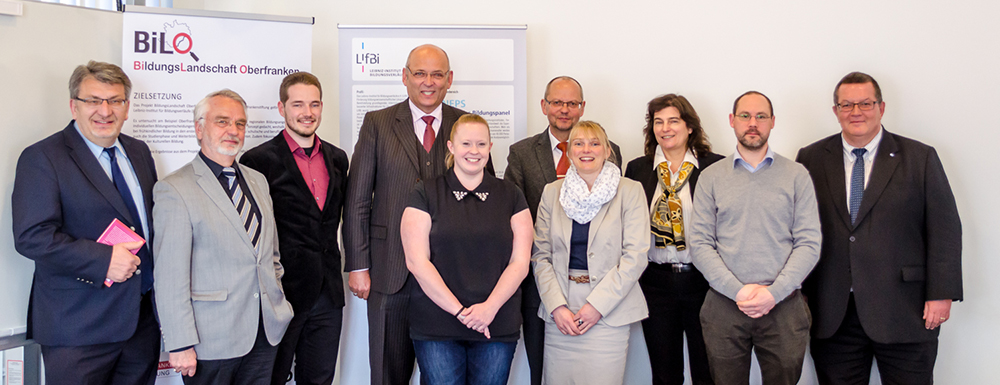
From left to right: Wolfgang Hoderlein, Manfred Egner, Johannes Hofmann, Heribert Trunk, Christina Zeichner, Prof. Dr. Hans-Günther Roßbach, Dr. Michaela Sixt, Christi Degen, Dr. Dirk Oberschachtsiek, Bernd Rehorz.
With about 48,000 corporate members and approximately 2,400 companies currently actively involved in providing vocational training to young people, the Chamber of Industry and Commerce (Industrie- und Handelskammer, IHK) for Upper Franconia is committed to strengthening specifically the regional economy. Challenges in this process include not only the acquisition of potential apprentices but—with a view to the shortage of skilled labor—also the continuing education and training of workers. In this context, the President of the IHK for Upper Franconia Heribert Trunk and the Head of the IHK Department for vocational training Bernd Rehorz confirmed their interest in the research findings of the NEPS. Hence, it is not only more information on untypical educational careers that is a concern of the IHK, but also the familial and school background of adolescents interested in vocational training, as Managing Director Christi Degen added.
Especially project BiLO can make an important contribution to this area that is of particular interest to the IHK—that is, the transition from school to vocational training in Upper Franconia. The attending members of the IHK for Upper Franconia pledged their full support to the research project, particularly with a view to the assessment of training companies. At the same time, Dr. Dirk Oberschachtsiek of the IHK Research Center Education in Bavaria offered to work, where necessary, with process-produced IHK data collected by the Research Center as part of the cooperation.
The LIfBi and its project BiLO thank all IHK representatives for the inspiring exchange of ideas, for their enthusiasm and pledge of support. With the three biggest chambers of the administrative region of Upper Franconia (IHK Bayreuth, IHK Coburg, and the Chamber of Trade) having confirmed their active support of the project, the scientists are now well on the way to assessing the availability of vocational training positions in the dual system for Upper Franconia in a most comprehensive and thus valid way as possible.